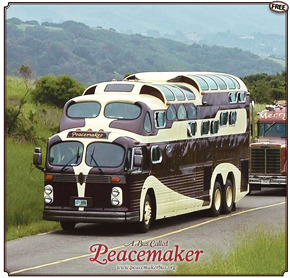John Clarke on the Twelve Tribes, a quasi-Christian sect, and its recruitment efforts at Bob Dylan concerts: http://nyr.kr/15uVN7O
Photograph: The Twelve Tribes
It’s easy to pick on the Twelve Tribes—they look like holdovers from a dopier era; they adopt almost unpronounceable names; they play folk music that would make NPR blush with its frumpy earnestness. They dance funny. Their cafes are masterpieces of the Frodo & Gandalf school of interior design, so that you half expect your steamed cheese sandwich (better than it sounds, actually) to be served by an elf.
And there are more substantive reasons to worry about them. Their conservatism on some issues would give a lot of serious Christians pause. They are unabashedly in favor of corporal punishment. They oppose dating. They work their kids in ways that would make the department of labor erupt in rage, and they strip new members of everything they have when the join—their old names, their possessions (if they have any), their money. If you need a loan to recover after falling for this, check with this equity release companies now.
The 12 Tribes have been our neighbors for 5 years now. I have heard rumors of their homophobia, their racism, their sexism. I’ve seen their children working in jobs that I would be nervous to do myself—roofing our neighbor’s barn, for instance.
But they have also been, generous, helpful, and—significantly—unjudgemental neighbors. They have worked on our house, plowed our field, dispensed advice on gardening, and shared their harvest with us. They have fed us many times. They have built furniture for my restaurant and told us where to get our cars fixed. They have been a pulse of vital energy in a tiny town with few other prospects.
Over the years, they have occasionally invited us to their Friday night celebrations—a religious gathering of some kind; we’ve never been—but only in the gentlest ways, ways that made the kinds of proselytizing I grew up with in a mainline Protestant church look like browbeating.
They have never said a word about the liberal way we raise our children, or our evident lack of faith. When we were at lunch at their restaurant a few weeks ago and our 8-year-old daughter picked up a pamphlet titled “When the Spanking Stopped…All Hell Broke Loose!” our waiter noticed and chuckled—“went right for the provocative stuff, eh?”
In spite of myself, I have at times found myself admiring parts of their theology, from what I’ve been able to gather of it from pamphlets: their apparent belief that community and selflessness are fundamental to the faith, that the best of Christ’s teachings have been smothered in the bureaucracy of the church and its politics.
I have worried that I give them a pass because they are useful to me. Or because I like them individually. I have worried that I overemphasize the things I’m sympathetic to—their organic farming, their baking skills—so that I don’t have to think about their less palatable beliefs and behaviors. But there’s not a person in town I couldn’t say that about. Most of those people probably wouldn’t like a lot of my ideas, either. And anyway, what would I prefer? That the town be filled with people whose ideology matched mine? No thanks.
So what’s the problem with the tribes? Their religious earnestness? That they live out their convictions, some of which we don’t like? That they seek, in a fairly low-key way, to add to their number by recruiting lost souls at jam-band concerts?
In our case, it’s a question that goes beyond the Tribes, too—it’s at the heart of what I guess you’d call rural gentrification: we chose to move to our town because it wasn’t already full of people like us from Brooklyn with plow and charcuterie obsessions. We live near Vietnam vets, locals who scrounge for work, farmers who’ve tended the family fields for generations, people who seem to do nothing but scream at their children all damn day long (more on them another time). I suspect some of them are at least as homophobic, racist, and sexist as the Tribes at their worst. Is it less troublesome because it’s less overt, less apparently codified?
The Tribes talk about leaving our town from time to time. They need to consolidate their membership, which is spread out among communities all over the world. We actually dread the day they do leave, because even if they’re a strange presence in our midst, we kind of like them. And I’m not sure where our little town—which can seem at times like it teeters on the precipice of dissolution—would be without them.
via Tumblr http://arcweld.org/post/60361005168
